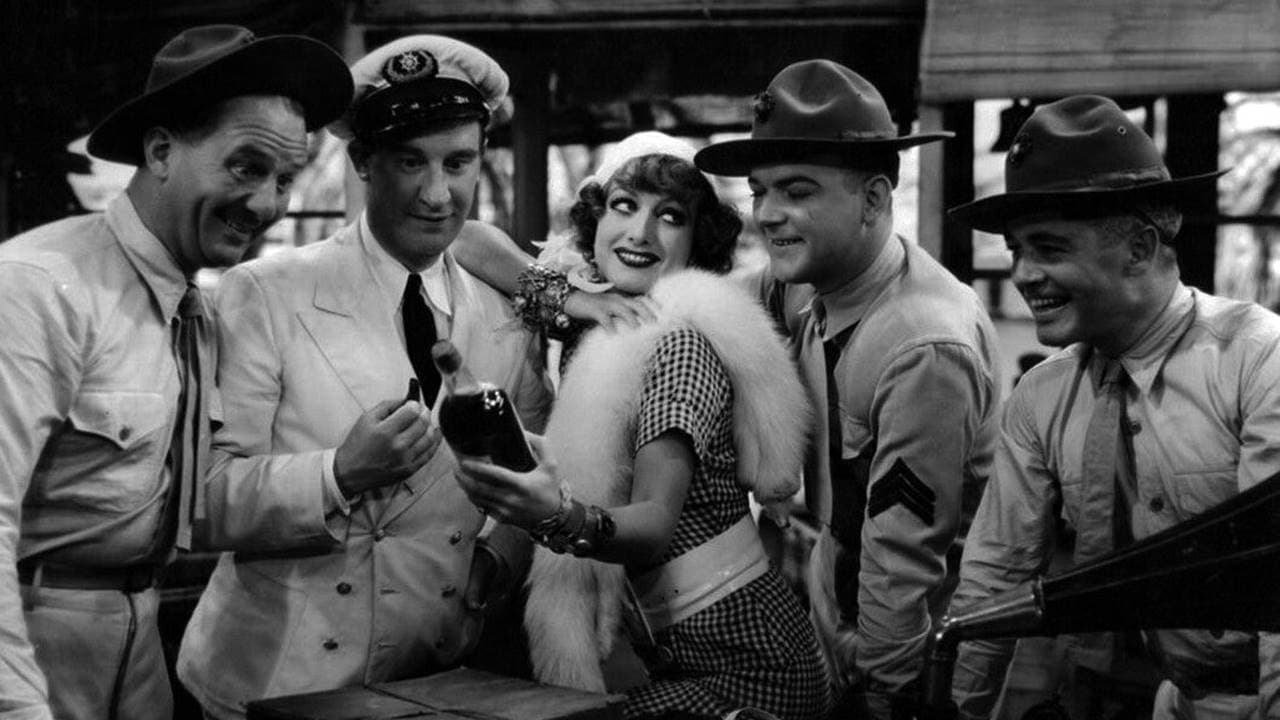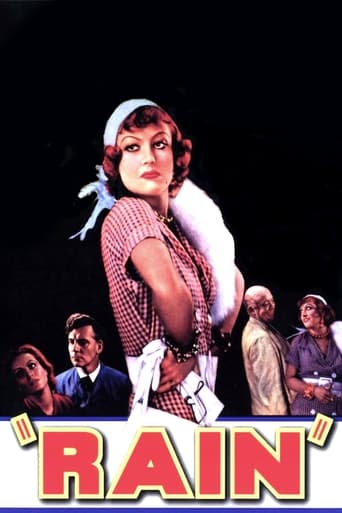

Brilliant and touching
... View MoreThis is a tender, generous movie that likes its characters and presents them as real people, full of flaws and strengths.
... View MoreAmazing worth wacthing. So good. Biased but well made with many good points.
... View MoreIt's a good bad... and worth a popcorn matinée. While it's easy to lament what could have been...
... View MoreThe rain falls incessantly in this movie, bringing to mind Matthew 5:45, "he sendeth rain on the just and the unjust alike". In this case, it seems clear that the 'unjust' are actually the devout Christians (Walter Huston and Beulah Bondi), as they sanctimoniously judge Joan Crawford's character and cruelly use their influence to get orders for her immediate deportation from Pago Pago, where this film is set. She is likely a prostitute, but the reason for his action stems from her (gasp) moral crime of listening to music and dancing with some soldiers on the Sabbath. As a more tolerant man observes, "we've all crossed thresholds we don't brag about", but Huston is relentless in cross-examining her about her past, and demanding that she get on the right side of the Lord, even though they've just met.It's interesting to see Crawford stand up to him in what are the best scenes of the film. "You keep yellin' at me to go back and be punished, to suffer – how do you know what I've suffered? You don't know, you don't care, and you don't even ask – and you call yourself a Christian!", she yells, and "Your God and me will never be shipmates, and the next time you talk to him you can tell him this for me – that Sadie Thompson is on her way to hell!" However, she is eventually cowed and resigned to be repentant, which is the first unbelievable part of an unbelievable ending, which I won't spoil.The movie is a little hard to watch because the main characters are so unlikeable. Huston and Bondi are righteous prigs. Crawford is heavily made up and often over-acts her part. There are a few good scenes, however, and it may be of interest to see this adaptation of the short story by W. Somerset Maugham, which spurred several other movies and plays.
... View MoreInteresting well-directed adaptation of Somerset Maugham story about a prostitute and a missionary out to reform her. I was surprised to discover this was a box office flop when it was released as I enjoyed it very much. Joan Crawford and Walter Huston are great as the two leads. Beulah Bondi and Guy Kibbee offer solid support. But the real star is Lewis Milestone's wonderful direction. He takes what would otherwise have been a very stagey film, especially for 1932, and keeps the camera moving and lively. Milestone not only directed but produced Rain as well. He was one of the best directors of the 1930s and I don't feel like he gets anywhere near enough credit. Try to catch this if you can but beware of bad prints.
... View MoreThere's a time in the early 1930s when almost primitive movie-making suddenly became more modern. It isn't a date...depending on the studio and the director, it seems to fluctuate between 1932 (when this film was made) and about 1936. Regardless, the production values here border on being rather primitive. So that's one black mark (or perhaps -- considering the main character -- I should say red mark) on my score card to begin with.And then there's Joan Crawford's characterization of Sadie Thompson. If the old adage of less is more...well, let's just say that director Lewis Milestone overdid it in regard to making us aware that Thompson was a loose woman. It wasn't so much that Crawford overacted, as much as the makeup people and costumer overdid the stereotype. And lest you think I'm just having a wrong perception because I'm watching the film in 2013, at the time of its release, "Variety" said: "Joan Crawford's get-up as the light lady is extremely bizarre. Pavement pounders don't quite trick themselves up as fantastically as all that." It is said this was Crawford's least favorite film, although it's unclear whether that was due to her role or the fact that it bombed at the box office. After her temporary reformation, the acting -- and the look -- is more realistic.Another thing I have against this film is the acting of Beulah Bondi. Bondi is one of my all-time favorite character actresses, but here she is so wooden and stereotyped as the role of the minister's wife.I feel the same about the acting of Walter Huston here. Wooden in both movement and speech. And yet, just four years later I felt he was magnificent in "Dodsworth".Matt Moore was fine as the doctor, and Guy Kibbee did nicely as the hotel owner.My criticism is not to say there were no high points. Some of the dialog is actually quite well written...just not performed realistically. And, for 1932, Milestone used some interesting camera angles.But overall, my opinion of this film is rather negative, and I guess we must blame the director/producer Lewis Milestone. Ironically, Milestone was a 4-time Oscar nominee, and took 2 Oscars home. Clearly his output was inconsistent.Oh, and by the way, having lived in the tropics for 2 years...they overdid it with the deluge of rain.
... View MoreEven for the 1930's this film was way over the top. Not even remotely close to reality. Heck the audiences didn't like it when it came out. Why? It wasn't believable.I think most will give this a favorable rating because of Joan Crawford. For me, this was her "bottom of the barrel" role. The premise in this film is so stupid it defies realities of that time.Basic premise is, a boat gets stranded on an island and a few sets of people get off to stay in a local hotel. 1 set is a bunch of holy rollers who think they can impose their will on anyone because they think they have the right. The other is a prostitute who likes to have fun, but, the holy rollers want none of it so the head preacher decides he wants her off the island. He heads to the Governors place to threaten him with his influence from Washington. So the Governor has told her she has to leave and all through out the head preacher baits her on and ruffles his feathers like he's the king of the island. She doesn't want to go back to San Fransisco like he wants because she'll be jailed for an unspecified crime.....but the dear ole preacher just says "you must atone". During all this you'll be grinding your teeth hoping this guy get what he deserves. Sadie now has decided she will go back...and has found religion.Turns out though the old preacher just didn't have the religion that ingrained in him. All the while they wait for the boat, the local tribe keep pounding out this drum beat and rhythm that the preacher succumbs to and he decides to take a turn at her. Next morning he turns up dead...suicide. He'd rather be dead than let everyone know he took a run at a prostitute.For me the acting performances are not what I had an issue with. It was the ridiculous material they had to work with...i.e...the story. Let me ask you. What religious nut from any time in America has had the influence to make a girl leave a place in which she's done nothing wrong? It's ridiculous. She's obviously a prostitute but all she did at the hotel was play music and dance. Where does this guy get the gaol to think he can control anyone's life? It's like the people around her just sit and stare and do nothing to help. They know he's a fanatic and that she's harmless but they do nothing. They could have took her away to hide her so she could leave whenever she wanted but nope. They sit back and do...nothing.As I've mentioned, the preacher gets what he deserves in the end but it left me wanting to take a shower after watching this. This film was not a winner. Sure it's dated but even for any day and time....it's ridiculous.
... View More